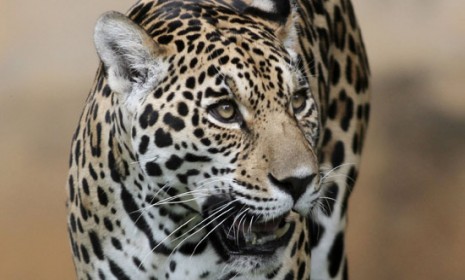Brazil's bizarre plan to clone endangered wolves, jaguars, and monkeys
Next month Brazilian biologists will attempt to genetically reproduce eight at-risk species in a lab

A free daily email with the biggest news stories of the day – and the best features from TheWeek.com
You are now subscribed
Your newsletter sign-up was successful
Cloning a dinosaur might be a doomed pursuit (much to the dismay of a generation raised on Jurassic Park fantasies), but biologists at Brazil's Brasilia Zoo want to use genetic information from endangered animals to shore up dwindling populations. Next month, zoo researchers plan to begin cloning eight "at-risk" species before they disappear from the planet for good. Here's what you need to know about the bizarre project:
What animals are they cloning?
"The idea is to start with an animal that is endangered, or where species numbers have gone down sharply, such as the jaguar, the maned wolf or even the local deer," says Carlos Frederico Martins, a researcher with Embrapa Cerrado, the government's animal research unit that's working with the zoo on the project. Beyond the animals Martin mentions, prospects for cloning include: The black lion tamarin monkey, the bush dog, the collared anteater, the gray brocket deer, the Brazilian aardvark, and the bison. Most of these species are on the International Union for Conservation of Nature's red list, but none is "critically endangered," says Andy Coghlan at New Scientist. This isn't the zoo's first stab at cloning; its experts have already successfully produced over a 100 copies of cows and horses.
The Week
Escape your echo chamber. Get the facts behind the news, plus analysis from multiple perspectives.

Sign up for The Week's Free Newsletters
From our morning news briefing to a weekly Good News Newsletter, get the best of The Week delivered directly to your inbox.
From our morning news briefing to a weekly Good News Newsletter, get the best of The Week delivered directly to your inbox.
How did they obtain genetic samples?
Researchers spent two years gathering roughly 420 genetic samples, mostly from dead animals scattered throughout the Brazilian outback.
How does the cloning process work?
Take for instance the top candidate for cloning: The maned wolf — an imposing, three-foot-tall animal covered in a thick, red pelt — of which just 23,600 exist in the wild. "A skin cell from the wolf would be inserted into the egg of a common dog from which the nucleus has been removed," says the Associated Press. The embryo would then be inserted inside the uterus of a female dog, which would serve as the cloned wolf pup's surrogate mother.
A free daily email with the biggest news stories of the day – and the best features from TheWeek.com
What will happen after the animals are reproduced?
They'll be kept in captivity as reserves in case wild populations get dangerously low, but there are no immediate plans to release the cloned animals into the wild. The cloned animals would lack the genetic variability of wild populations for the time being anyway, says Martins. "The idea is not to use cloning as a primary conservation tool," and it shouldn't serve as a "substitute to protecting endangered animals' habitats."
Have rare animals been successfully cloned before?
Yes. The ox-like gaur and the sheep-like mouflon have both been genetically reproduced. Biologists even attempted to clone an extinct mountain goat called the Pyrenean ibex, but unfortunately the specimen died at birth. The Brasilia Zoo's more versatile techniques should give its clones a better shot at survival.
Sources: AFP, Associated Press, New Scientist, The Telegraph
-
 How the FCC’s ‘equal time’ rule works
How the FCC’s ‘equal time’ rule worksIn the Spotlight The law is at the heart of the Colbert-CBS conflict
-
 What is the endgame in the DHS shutdown?
What is the endgame in the DHS shutdown?Today’s Big Question Democrats want to rein in ICE’s immigration crackdown
-
 ‘Poor time management isn’t just an inconvenience’
‘Poor time management isn’t just an inconvenience’Instant Opinion Opinion, comment and editorials of the day